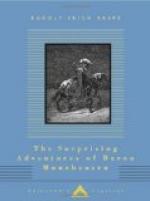The merit of Munchausen, as the adult reader will readily perceive, does not reside in its literary style, for Raspe is no exception to the rule that a man never has a style worthy of the name in a language that he did not prattle in. But it is equally obvious that the real and original Munchausen, as Raspe conceived and doubtless intended at one time to develop him, was a delightful personage whom it would be the height of absurdity to designate a mere liar. Unfortunately the task was taken out of his hand and a good character spoiled, like many another, by mere sequel-mongers. Raspe was an impudent scoundrel, and fortunately so; his impudence relieves us of any difficulty in resolving the question,—to whom (if any one) did he owe the original conception of the character whose fame is now so universal.
When Raspe was resident in Goettingen he obtained, in all probability through Gerlach Adolph von Munchausen, the great patron of arts and letters and of Goettingen University, an introduction to Hieronynimus Karl Friedrich von Munchausen, at whose hospitable mansion at Bodenwerder he became an occasional visitor. Hieronynimus, who was born at Bodenwerder on May 11, 1720, was a cadet of what was known as the black line of the house of Rinteln Bodenwerder, and in his youth served as a page in the service of Prince Anton Ulrich of Brunswick. When quite a stripling he obtained a cornetcy in the “Brunswick Regiment” in the Russian service, and on November 27, 1740, he was created a lieutenant by letters patent of the Empress Anna, and served two arduous campaigns against the Turks during the following years. In 1750 he was promoted to be a captain of cuirassiers by the Empress Elizabeth, and about 1760 he retired from the Russian service to live upon his patrimonial estate at Bodenwerder in the congenial




